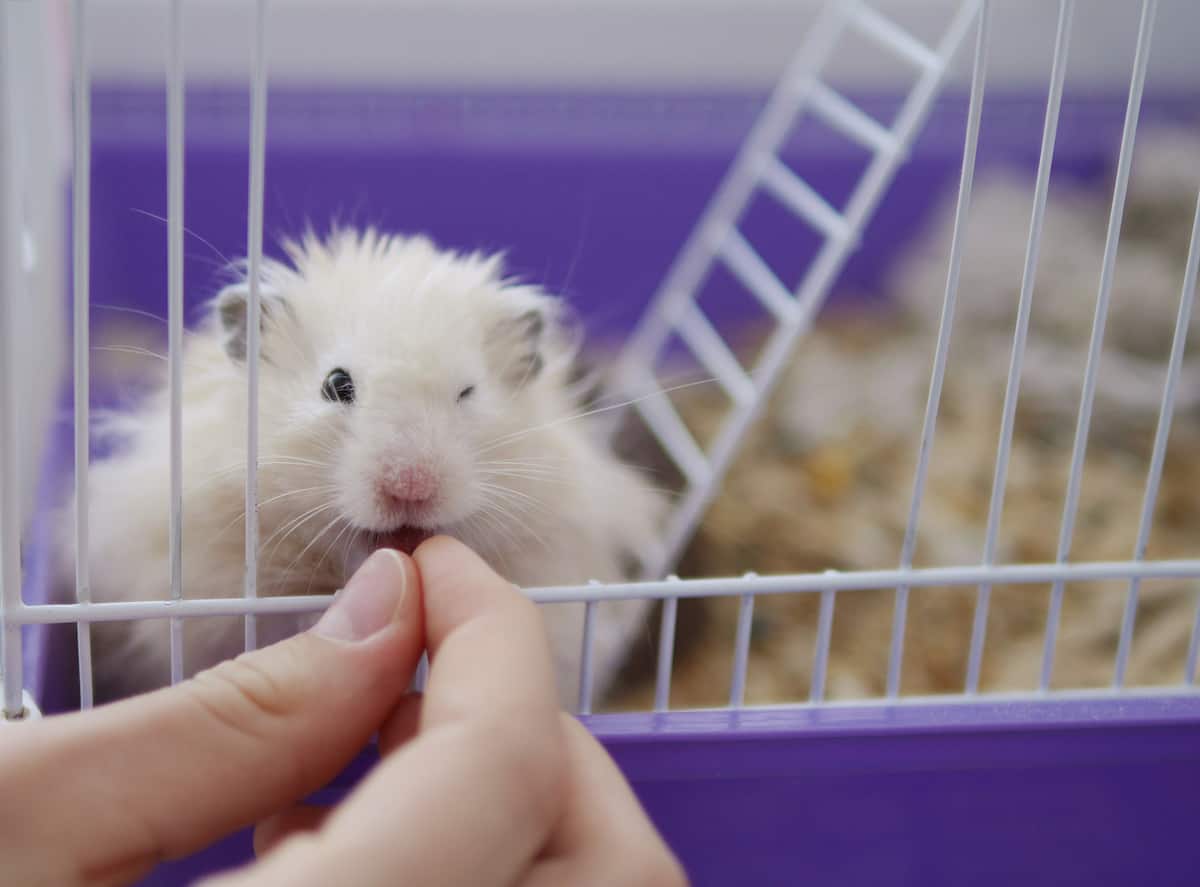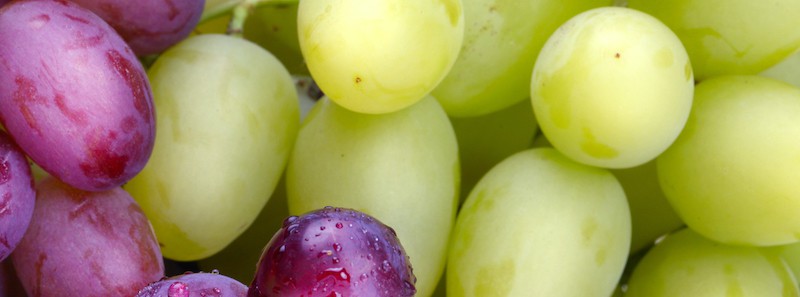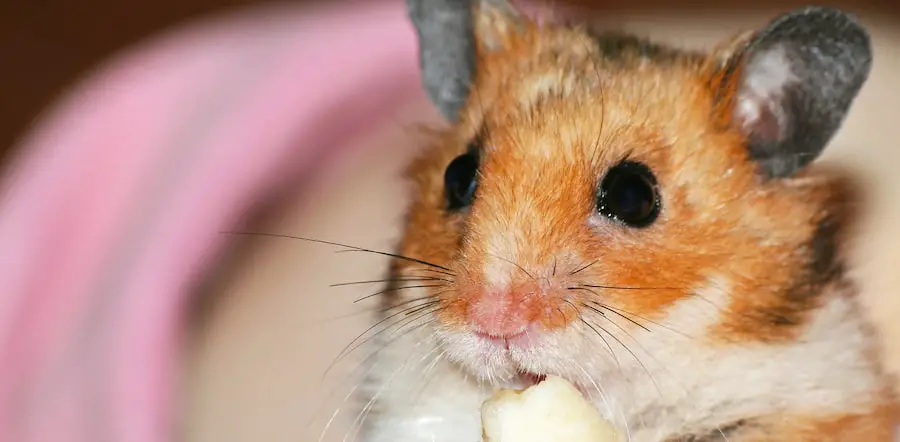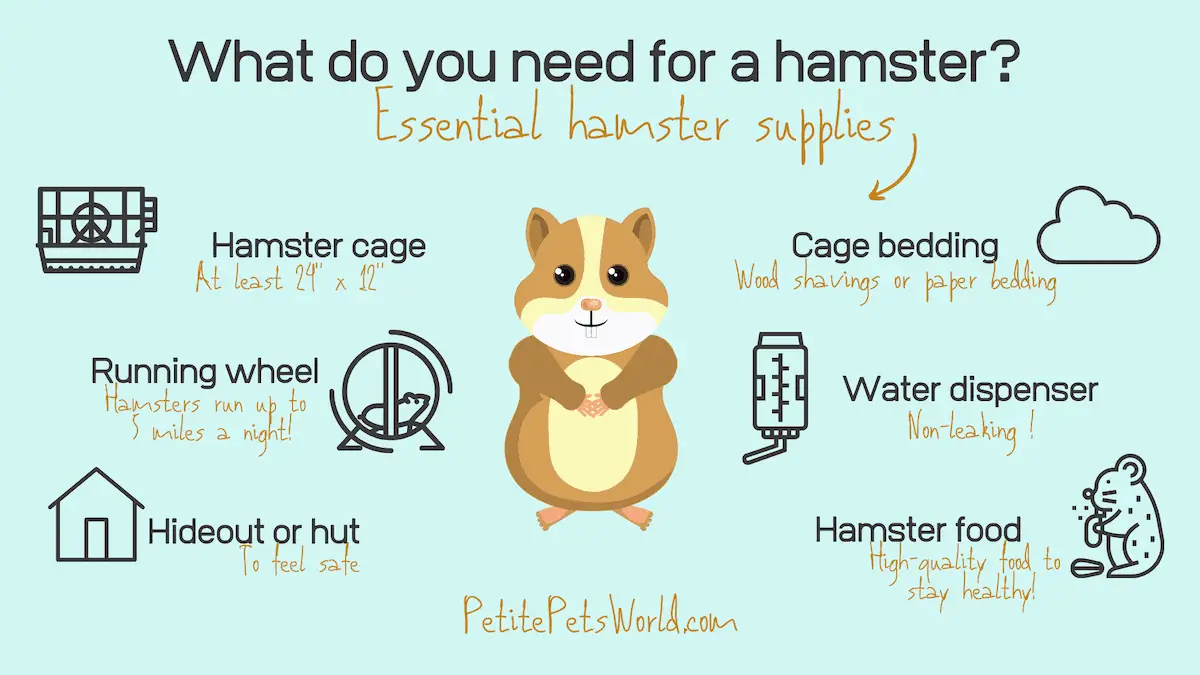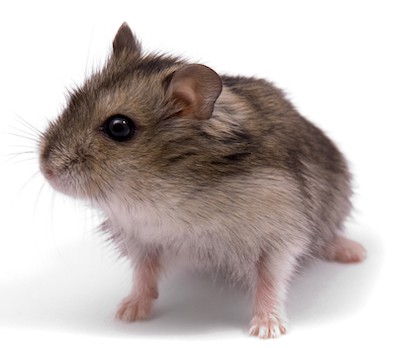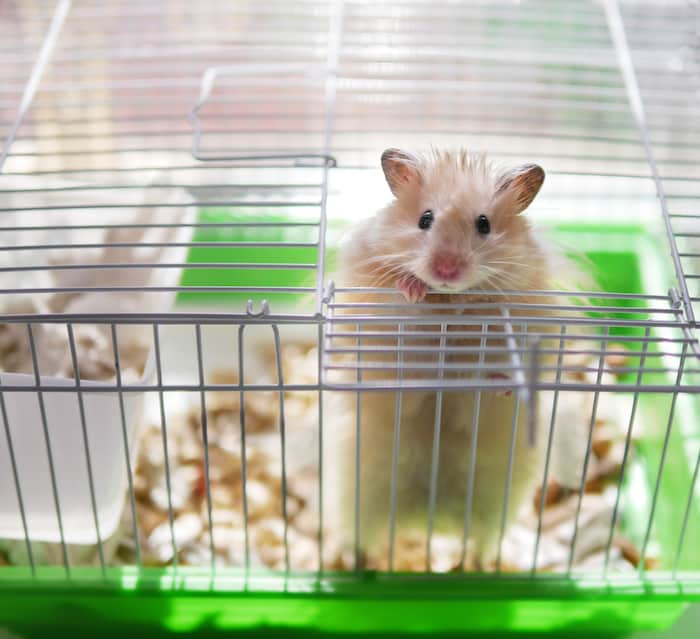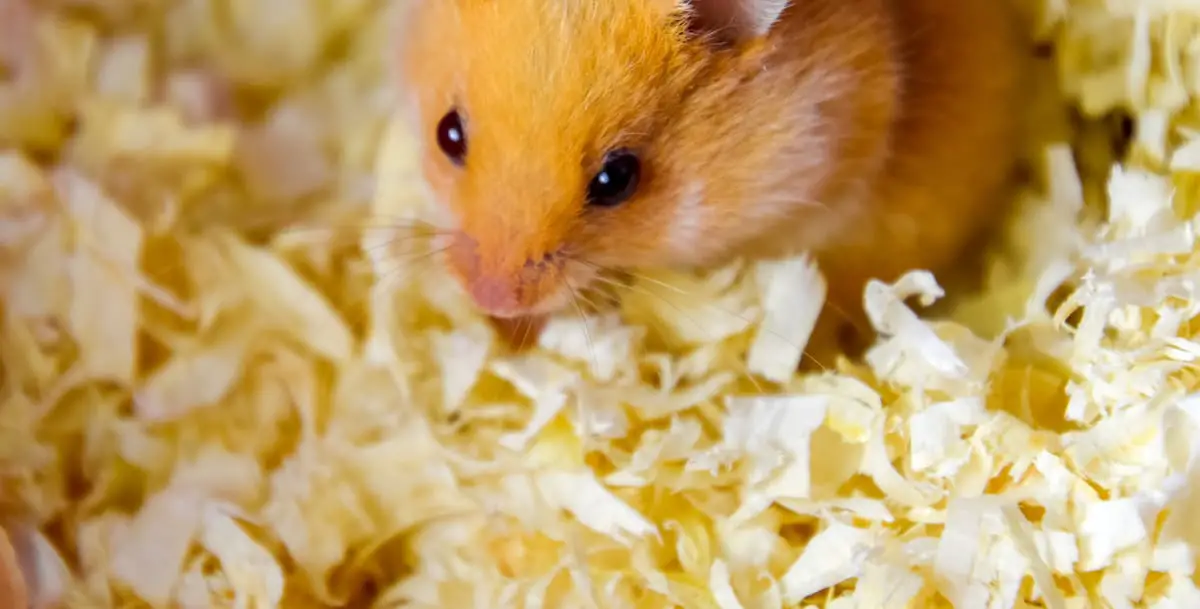Although the term "fur-baby" tends to refer to a cat or a dog, you know it in your heart that your hamster has a special place in your family as your own fur child—even though they're not very furry.
To help you give your hamster his or her best growth, you want to be able to fuel them up for a healthy life.
Since a hamster's nutritional diet isn't exactly common knowledge, we hope this guide can help you with the finer details of the ideal hamster diet.:
*PetitePetsWorld strives to be a valuable resource for pet owners. We select and review all products independently; however, we may earn affiliate commissions when you buy through links on our site.
Best Hamster Food - TOP 3 in 2021
Kaytee Fiesta Hamster and Gerbil Food
Key Featutes
- Ingredient rich blend of a delicious variety of superior grains, seeds, vegetables, and fruit provide enrichment and mental stimulation.
- Natural antioxidants are included to support the general health and immune system.
- Natural ingredients, which include probiotics and prebiotics, support the digestive health of your little pet.
- Larger pieces of food in the package encourage chewing, which promotes dental health.
- The freshness of the ingredients is naturally preserved.
- Nutritional experience earned by the Kaytee brand marks over 150 years.
Summary:
Kaytee Fiesta Hamster Food is a gourmet food mix developed for your little pet. Nutritionally fortified with a superior blend of fruits, vegetables, seeds, and grains, guaranteeing optimal nutrition for small animals.
Your little pet is bound to have fun with their Kaytee food, considering the variety of options they have at their disposal. Having Kaytee as a part of your hamster's healthy feeding routine will ensure that your pet lives a long and healthy life. With over 150 years of nutritional experience, Kaytee Fiesta Hamster Food comes highly recommended.
Kaytee uses high-quality grains, seeds, vegetables, and fruits to develop foods that support the general health and immune system of your little hammy. The food also provides hamsters with enrichment and mental stimulation to support a happy life.
Pros
+ Developed with natural ingredients and antioxidants
+ Stimulates your hamster and keeps him interested
+ Promotes dental health
+ Keeps your hamster strong and healthy
+ Provides everything your hamster needs for a long and healthy life
+ Probiotics and prebiotics support digestive health
+ Ingredients are naturally preserved
+ A colorful blend of food, bound to entertain your little pet
+ Users report that hamsters enjoy the variety
Cons
- If your hamster is overweight, we only recommend this blend as a treat
Oxbow Animal Health Hamster and Gerbil Fortified Food
Key Featutes
- Offers balanced nutrition for your pet
- Every kibble is 100% uniform to avoid selective tendencies
- Oxbow hamster food is made with prebiotics and chelated minerals
- The food is rich in antioxidants
- No refined sugars and artificial ingredients
- It doesn't contain seeds, fruits, or "mystery" bits
- Timothy Hay-based formula
- High-quality Oxbow foods are formulated with the guidance of veterinarians and nutritionists.
Summary:
Oxbow Animal Health Hamster and Gerbil Fortified Food is recommended by small animal owners worldwide as the food has been developed with the guidance of veterinarians and nutritionists.
It offers a complete and balanced diet as such to keep your pet healthy and nourished.
To avoid and prevent unhealthy selective eating, which is natural for small pets, Oxbow has formulated kibble that ensures healthy and nutritious food with every bite. Pelleted foods like this one are especially beneficial for hamsters that tend to gain weight easily or may suffer from a lack of nutrients caused by selective eating.
This Oxbow hamster food comes with lots of beneficial antioxidants, and it is specially formulated with prebiotics and chelated minerals. The nutrients and minerals are easily absorbed, and they promote digestive function and guarantee your pet's health.
This food guarantees high-quality nutrition to ensure the health and happiness of your hammy.
Pros
+ Encourages non-selective eating
+ No artificial ingredients such as food dyes, flavors, or preservatives
+ Oxbow hamster food contains essential vitamins, minerals, and nutrients to provide your small pet with all it needs.
+ Pelleted food prevents obesity by not enabling picky eating
+ Crunchy kibble promotes dental health
+ Made in the U.S. with high-quality ingredients
Cons
- If your hamster is a selective eater, it may take a while for them to get used to this food. However, particularly these picky eaters will benefit from pelleted foods that offer all the nutrients they need.
Wild Harvest Hamster and Gerbil Advanced Nutrition Diet
Key Featutes
- An excellent blend of natural ingredients that support the overall health of small animals.
- Includes essential nutrients to protect the good health of the intestinal tract.
- Important dietary variety is provided as grains, crunchy nuts, bite-sized fruits, delicious seeds, and wholesome vegetables are all included in this tasty blend.
- It is developed with a Fruit Amp formula for sustaining the health of your small pet.
- Food is kept fresh during storage with resealable packaging.
Summary:
Wild Harvest Hamster and Gerbil Advanced Nutrition Diet provides optimal nutrition with a focus on added flaxseeds to support your small pet's health and wellbeing.
With a nourishing blend of grains, fruits, and vegetables in just the right proportions, you can be assured that your small pet will be healthy and bursting with energy to run in their hamster wheel to their heart's content!
The nutrition provided by this wonderful blend makes for a healthful diet, and hamsters will be sure to lick their bowls empty and leave no room for more.
Take care not to overfeed, though. You will want to serve them with a sufficient amount to keep those bones strong, vision crystal clear, and energy in abundance - but also to avoid health issues caused by overeating.
Pros
+ Great content variety available so the little hamsters are spoilt for choice.
+ All the vitamins, minerals, and nutrients your hamster needs
+ Crunchy nuts promote dental health
+ Fruit Amp formula supports a healthy life
+ Added flax seeds for optimal nutrition
+ Ingredients included in this blend are rich in protein and fiber
+ Excellent price-quality ratio
+ Resealable package
Cons
- Some pellets get crushed easily and form powder
- The package should be kept closed to prevent drying
Picking Out the Menu:
Types of Food to Feed Your Hamster
From muesli to pellets, there are so many different types of food to test out with your hamster.
Picking out the best food for your hamster is not as simple as just choosing the first bag you see. You have to consider nutritional benefits and preference, among other things.
The more natural you choose, the better—especially since most hamsters like fruits and veggies as components of their everyday diet.
For a little extra protein, you can also feed your hamster with pieces of hard-boiled egg or mealworms.
There are foods that you'll want to avoid as it can be quite unhealthy or dangerous for your hamster, but we'll get into that later.
How much food should you give your hamster?
You want to spoil your small fur-baby—but how much is too much?
According to the PDSA, you should be feeding your fully-grown hamster around 8-10 grams of dry hamster food, at least two times per day.
However, that's just a suggestion. You need to take your hamster's age, breed, and health status to gauge how much he or she needs.
If you want to be the most accurate, you can also ask your hamster's vet on the recommended quantity and type of food your hamster should be waiting.
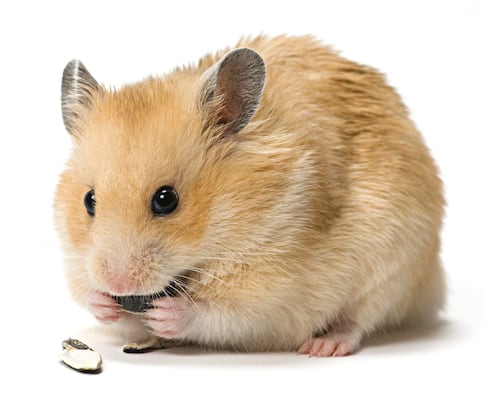
The Best Times to Feed Your Hamster
Although there might be varied opinions when it comes to feeding times for your hamster—whether young or fully grown—the general consensus is two times a day, especially when they are on average pretty active.
Interestingly enough, hamsters actually stuff and collect food in their cheek pouches to snack on later—waking up multiple times a day to snack on the food they've got packed and hid in their cheeks.
Foods to Avoid in Your Hamster's Diet
Although you may want to always slip a bit of food from your dinner's leftovers into your hamster's cage for munching, you might need to be a bit careful about what you give him or her to eat.
To help keep your hamster as safe and as healthy as possible, avoid these foods since they can be dangerous to your mini fur-baby:
- Almonds: Generally too high in fat for a hamster's digestive system
- Celery: The physical, stringy texture of celery can be a choking hazard
- Chocolate: Just like with dogs, chocolate can be quite harmful to your hamster
- Garlic and Onion: This type of food can lead to indigestion and various blood disorders
- Iceberg Lettuce: Not only is this low in nutrition, but it can also cause diarrhea
- Peanuts: Too high in fat and can endanger your hamster of dehydration
- Spicy food: In general, this type of food can cause diarrhea in your hamster
- Tomato leaves: Are poisonous to hamsters
Other foods that should also be avoided include:
- Apple seeds
- Raw beans or potatoes
- Citrus fruits
- Rhubarb leaves or raw rhubarb
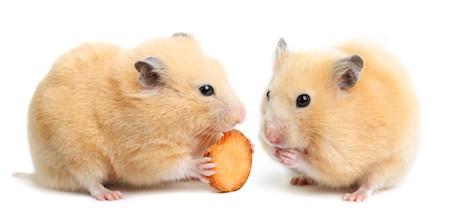
Things to Consider When Buying Hamster Food
Whether your hamster's vet has dictated a specific dietary need that your hamster has or if you need help choosing which type or brand of food your hamster needs, there are different properties and components of hamster food that you should consider.
Unfortunately, although your budget may not allow for extremely high-quality food, you also want to avoid the cheapest, most affordable packaged food. Most of these brands contain fillers in their foods and are rated low in nutritional value.
Especially since hamsters—just like all creatures and human—have specific nutritional needs, you'll need to do your research to make sure that you are investing in a nutritionally beneficial, packaged hamster food.
To help you choose the right hamster food, here are a few things that you should be considering:
Although this isn't a necessarily make or break component of the type of food you serve your hamster when it comes to nutritional value, the brand name packaged foods that are the most popular generally have a reputation for setting out healthy foods.
If you're going to be investing in a brand name food, you can usually rest assured that it contains the nutritional value that your pet needs. Most no-brand packages have a lack of quality in ingredients and can cause malnutrition in your hamster's health.
Check out the reviews about how other hamster owners rate the flavor and taste of the product—not that they themselves have taste-tested it, but how their pets have reacted to flavor, taste, and texture. Just like human food, hamster food can be too sweet, bitter, or even salty. You can tell your hamster's reaction to food if they reject to eat it.
To help transition your hamster to a different food type, you want to introduce and integrate it in small quantities so they can get used to it.
Obviously, as we stated before, the nutritional value of your hamster's food can also have a significant impact on their health. Try and stay within the constraints that we mentioned above when it comes to protein, fat, and fiber.
Taking the time to read the nutritional value label at the back of your hamster's food can help you check out the numbers related to the various components. Try and choose a food with a healthy balance.
From how old they are to your hamster's life stage—whether they're still growing or if they've reached adulthood—plays a massive role in the type of food your hamster needs.
As we mentioned before, just like with other animals and humans, the nutritional requirements will change depending on the age of your pet. Younger hamsters have different dietary needs than adults and vice versa.
From pellets to a scrambling type of muesli, you want to consider the form of food, as well. Not only does the food need to be the right length or size, but it also needs to be the right texture to have them chew like normal.
Tips for Picking the Perfect Hamster Food
If you find yourself standing in front of the hamster food section in your local pet supermarket, you might need a bit of guidance.
From the employees to your hamster's vet, there are various opinions or suggestions you need to work through to pick out the very best hamster's food for your pet's health.
To help you out, here are a few tips:
1. You need to be aware that some—if not most—pre-packaged foods won't have the right nutrition for your hamster.
2. Check with your vet the right time to feed your hamster—some people suggest that evenings are best since most hamsters are nocturnal.
3. Don't leave food in your hamster's cage to rot. Make sure you're cleaning that area of the cage thoroughly since this could lead to your hamster eating expired food.
4. Even if the packaged food you're giving him or her is not entirely high-quality, you can also add in natural fruits, vegetables, nuts, and specialized protein blocks to your hamster's diet.
We hope that this guide has helped you pick out not only the best food for your hamster's health but also answered any questions you may have had about the finer details of hamster health and diet.
*Disclaimer: As an Amazon Associate we earn from qualifying purchases. That means we receive a small commission from Amazon if you should decide to purchase a product through our link - but don’t worry, you won’t be charged any extra for it.
We only recommend products we truly believe are of value to you, and we believe in ourselves. Our goal is to make this site a truly valuable resource for all pet owners.
